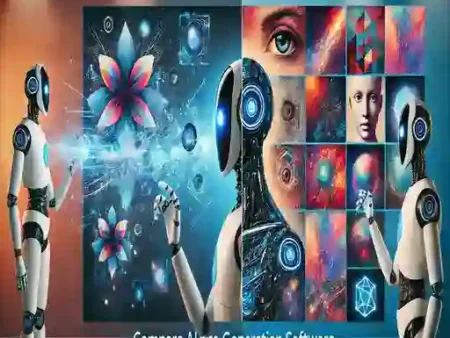Table of Contents
ToggleAI Music Generators: Transforming Sound with Artificial Intelligence
The development of AI has greatly advanced in different fields, and one thrilling use is creating music.AI music makers are changing the way we make music, letting people of all skill levels—from beginners to experts—create songs, rhythms, and complete orchestral pieces without having to study music formally.This blog delves into AI music creators, their significance in the music sector, and highlights some of the leading AI tools currently on the market.
What is an AI Music Generator?
An AI music creator employs machine learning techniques to craft tunes by studying large collections of songs and music principles.These tools can independently compose tunes, chords, rhythms, and verses in different music styles.AI music creators let people make new tunes or jazz up their own music.
The Role of AI in the Music Industry
AI is revolutionizing the music industry in several ways:
- Democratizing Music Creation: AI generators allow anyone to create music without deep knowledge of music theory or instruments. This opens up opportunities for non-musicians and enthusiasts to compose songs.
- Enhancing Creativity: Musicians and producers can use AI tools to generate ideas, rhythms, and melodies they might not have thought of otherwise, pushing the boundaries of creativity.
- Efficiency in Production: AI generators can quickly compose tracks, allowing producers to streamline the music production process, focusing more on refinement than on composing from scratch.
Top 5 AI Music Generators
- Amper Music (Link) Amper is one of the most popular AI music generators, designed for both amateurs and professionals. It uses its vast sound library and AI algorithms to create unique compositions. Users can adjust various elements, like instruments and tempo, to fit their desired sound.
- AIVA (Link) AIVA (Artificial Intelligence Virtual Artist) is an AI tool that can compose classical and modern music. It’s widely used for creating soundtracks for games, films, and commercials. AIVA provides users with a range of customization options to tweak the composition.
- Soundraw (Link) Soundraw is designed for creators who need royalty-free music quickly. It allows users to customize generated tracks, including altering tempo, mood, and style, making it a favorite among video creators.
- OpenAI’s MuseNet (Link) Developed by OpenAI, MuseNet can generate songs in up to ten different instruments and various styles, including pop, jazz, and classical. Its flexibility and wide genre coverage make it one of the most versatile tools.
- Boomy (Link) Boomy lets users create original songs in seconds. It also allows creators to upload their tracks to streaming services, making it perfect for aspiring artists who want to share their music with a global audience.
FAQs About AI Music Generators
- What is an AI music generator?
An AI music generator uses algorithms to compose and produce music autonomously or semi-autonomously. - How do AI music generators work?
These tools analyze large datasets of music, learning patterns in melodies, harmonies, and rhythms to generate new compositions. - Can AI replace human composers?
While AI can generate music, it lacks the emotional depth and cultural context that human composers bring, so it is more of a tool than a replacement. - Is AI-generated music copyright-free?
It depends on the platform. Some AI-generated music is royalty-free, while others may have licensing restrictions. - What genres can AI music generators create?
AI can generate music across genres, including classical, pop, jazz, electronic, and more. - Do I need musical knowledge to use AI music generators?
No. AI music generators are designed for users without any musical background, allowing anyone to create music. - Can AI music generators create lyrics?
Yes, some AI tools can generate lyrics, but they tend to be simple and require refinement from a human. - What are the benefits of using AI in music production?
AI can speed up production, generate new ideas, and help non-musicians create music. - Are AI music generators expensive?
There are both free and paid options. Many platforms offer free trials or freemium models with basic functionality. - How customizable are AI-generated tracks?
Users can often adjust elements like tempo, instruments, genre, and mood, depending on the tool. - Can I sell AI-generated music?
Yes, many platforms allow you to own and sell the music you create, but it’s essential to review the licensing terms. - What industries use AI-generated music?
AI-generated music is used in video games, film scoring, commercials, content creation, and even live performances. - Is AI-generated music good quality?
The quality varies by tool, but many AI-generated pieces are of high enough quality for commercial use. - Can AI help with music theory?
Yes, AI can assist users by suggesting chord progressions, melodies, and rhythms that follow music theory principles. - How does AI-generated music compare to human-made music?
AI-generated music can be technically impressive but may lack the emotional and creative subtleties that human composers offer. - What’s the future of AI in music?
AI is expected to become more integrated into the creative process, offering even more sophisticated tools for collaboration between humans and machines. - Is AI music safe for commercial use?
Yes, AI-generated music is often royalty-free or licensed for commercial use, but always check the specific platform’s terms. - Can AI music generators work offline?
Most AI music generators are cloud-based, requiring an internet connection, though some offer offline functionality. - Can AI generate music for specific moods or scenes?
Yes, many AI tools allow users to select mood settings like happy, sad, dramatic, or energetic. - Do AI music generators have limitations?
AI music can sometimes sound repetitive or generic, and fine-tuning may be needed to meet specific creative goals.
Conclusion
AI music generators are reshaping how music is composed and produced. Whether you’re a novice looking to experiment with sounds or a professional seeking new creative ideas, AI tools provide endless possibilities. They offer a fast, efficient way to create music and open the doors to anyone who dreams of becoming a composer. With tools like Amper Music, AIVA, and Boomy, the future of AI in music is incredibly exciting.
By integrating AI into the creative process, we’re witnessing a new era in music—one where machines complement, rather than replace, human artistry.




